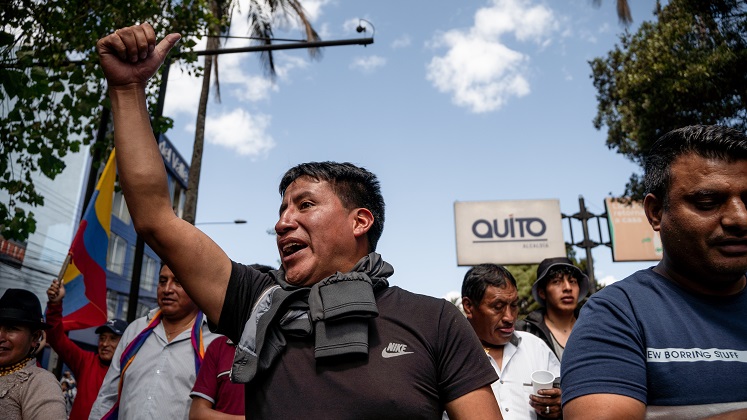With no currency of its own, Ecuador is sterilizing its resources by accumulating reserves while Government promotes austerity. The country must ensure that social policies are not negatively affected by the accumulation of funds, explains Katiuska King (Universidad Central del Ecuador)
Guillermo Lasso began his presidential term in May 2021 and almost immediately initiated a rapid Covid-19 vaccination rollout, which can be considered a success. The campaign took place in the context of slow and privileged access during the previous Government, where only those considered important had access to vaccines. As of June 2022, 80% of Ecuadorians have been fully vaccinated against coronavirus.
However, that achievement was overshadowed by the weak recovery of the Ecuadorian economy in comparison to the Latin American regional average of 5.9% and the neglect to which public health, both staff, and hospitals, was subjected. Although the new Government gambled on vaccination to stimulate the economic recovery, 2021 closed with a growth of 4,2%, well below the needs of the country, while GDP had fallen almost 8% in 2020.
This can be explained, in part, by the continuation of the economic script derived from the extended fund arrangement (EFA) the Ecuadorian Government initially signed with the International Monetary Fund (IMF) in March 2019. In 2021, two important IMF-related legal norms were approved. One, the economic development bill, increased tax revenues and allowed the regularisation of assets abroad, while the so-called defence of the dollarisation bill, sterilised resources to improve the accumulation of reserves in an economy without its own currency.
This bill illustrates one of the main problems of the IMF and previous Ecuadorian authorities: their misunderstanding of an economy that uses an external currency: i.e., the US dollar. Consequently, Ecuador has no exchange rate policy, which means it can neither devaluate nor increase the value of its currency. Ironically, nations keep foreign reserves precisely for the operations that Ecuador cannot implement. In the case of a real exchange rate, the only variable in which the country can partially intervene is inflation, which is on the rise due to the global increase in the cost of products, supply chain problems, and the Russian invasion of Ukraine.
Structural adjustment policies
Although resources of more than US$ 9 billion are invested abroad, and new taxes are collected from large companies and high-net-worth individuals, they have not been allocated to public health or other critical social needs. This is a result of the structural adjustment policies Ecuador continues to promote and despite what the pandemic has highlighted worldwide: A need for a strong state that observes the health and informality problems, all of them very common in Latin America.
This intentional restriction of resources proves that it is not possible to simply vaccinate and ignore the eventuality of other diseases and social problems. In addition, measures like the gradual reduction of the Currency Exit Tax and its elimination for credit card transactions up to US$ 5000 and the removal of tariffs disregard the fact that, as of December 2021, the non-oil trade balance slid once more into negative territory. It seems that the external sector needs are, again, put aside due to the current high oil prices. Guillermo Lasso’s economic policies have shown a poor grasp of the situation, as happened with the IMF diagnosis.
Despite the Government’s compliance with the IMF agreement, the success indicators defined by this deal have not shown a positive response. Ecuador’s country risk closed at 871 basis points in 2021 compared to the previous 721 before Guillermo Lasso took power. The country’s economic situation is not good: employment recovery is slow and happens when a problem does not improve. Migration increases above all in the context of material needs and a workforce shortage in the United States. Reports of Ecuadorians attempting to cross the US-Mexican border are rising, and Ecuador ended in 2021 with a negative migratory balance of 92 thousand people.
Measures that could improve the economy
In a country with no currency of its own, capital repatriation becomes critical to keep the exchange rate regime that needs dollars and can’t issue them. Ironically, migrant remittances again alleviate the need for foreign exchange. To improve this situation, some Ecuadorian colleagues, including myself, are proposing an alternative means of repatriating capital through the international banking system regulations.
These banking regulations are referred to as the Basel II, II.5 and Basel III rules and have been implemented to various degrees in Latin American countries. The Basel banking norms suppose that regulatory capital would be a minimum of 10.5% or higher, which can be used to avoid capital outflows via mechanisms for applying the new requirements. Such instruments are presented in our proposal for a dollarised economy: conditional integral regulation, together with liquidity lines that would promote capital repatriation.
The need for these mechanisms is clear, given that with the approval of the Economic Development legislation, it is now possible to regularise assets abroad. Therefore, Ecuador will likely see false foreign sales registered by local companies to take advantage of tax and other benefits, a concept defined as the cocacolonisation of savings, which I have explored in a recent article published by ECLAC.
On the other hand, the Government aims to improve the economic situation by extracting concessions. Specifically large-scale open-pit mining. However, attracting this type of investment to promote growth could worsen the problem; this is an activity with few linkages, little job creation and high conflictive costs. It threatens water sources indispensable for food sovereignty, which has become increasingly important and even vital during the pandemic, and, ultimately, is one of Ecuador’s economic advantages.

Ecuador today
Keeping the structural adjustment policies is impacting the somewhat discouraging present of Ecuador, given that the economic outlook has consequences at the social, political and institutional levels. With different governance, the lack of employment opportunities could have been partially resolved by using the international reserves despite the evident social needs. As a result, there is an increase in migration, polarisation, and violence.
Part of that polarisation is reflected in the National Assembly’s decisions. With Lasso’s party being a political minority and thanks to a political system heavily biased in favour of presidential power, only one piece of economic legislation has passed during his administration through a process known as the Ministry of Law. The financial legislation has a 30-day term to be considered by Congress. If the proposal is not amended within that period, it will be approved as it arrived. This scenario was triggered by a lack of agreement in the National Assembly thanks to the abstention of the legislative bloc of former President Rafael Correa.
This institutional and social crisis is of no lesser importance. Financial scandals within the police and the armed forces and the attempted assassination of a mother whose baby died in consequence. This case was linked to the non-payment of alimony and is one of the recent examples revealing the cracks in public force institutions.
The protests that lasted 18 days against high living costs promoted by the indigenous movement prove the discontent against Ecuadorians’ hardships. If Ecuador wants to improve its economy, it must consider solutions like using fiscal policies to tackle social needs and the repatriation of capital. Still, at the same time, it should monitor that the country does not end in a cocacolonisation of savings.
Notes:
• The views expressed here are of the author rather than the Centre or the LSE
• Please read our Comments Policy before commenting
• Banner image: Protesters in Ecuador move during 2022 protests / Bryan Teran (Shutterstock)





